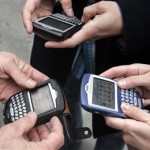Israel's BlackBerry Gap
 After a week meeting with senior defense and political officials in Jerusalem, one thing's surprised me: you'll see few BlackBerrys in Israel.
After a week meeting with senior defense and political officials in Jerusalem, one thing's surprised me: you'll see few BlackBerrys in Israel.
Over the last week it has surprised me that there were so few BlackBerrys in Israel’s capital of Jerusalem. In a city that is supposed to be the center of their politics, I met with probably a dozen senior defense, foreign affairs and political officials – and spotted only one BlackBerry.
In fact, it seems as though the typical politico’s phone is a simple, throwaway flip-phone that you could get for free in America with a contract. Sitting down for dinner with Herb Keinon, a writer for the Jerusalem Post, I expressed my consternation – having been away from the States for only a few days, I was already undergoing the jittery effects of BlackBerry-withdrawal. Keinon too, had not yet switched over to a smart phone.
The difference, Keinon says, is the preponderance of radio news. “Radio is a major element [of news dissemination] here,” he said. “Israelis are very in tune with the radio. You hear the beeps on the radio [signaling a news event] and you listen.”
Top spokespersons for the IDF, too, appeared to have no BlackBerrys (though one did show up to dinner with a loaded rifle). How, I asked Keinon, did he ask questions of political spokespersons? “I call them!” he said. A table of American reporters around him explained that calling rarely gets a frank response from risk-adverse American political spokespersons, many of whom like to see what the questions are up front before they issue a response.
Keinon said that spokespersons are typically empowered to talk to reporters without checking in with the chain of command. And of course, there is the stereotypical Israeli frankness. “People will just tell you bluntly what they have to say,” he said - there is no literal translation of the word ‘subtle’ in Hebrew.
Israel is a country that is still slow to pick up on new media trends, especially in politics –something that is no doubt related to a lower number of smart phones in Jerusalem. However, this is quickly improving in official circles: for example, the Israeli Defense Forces were quick to tweet pictures of armaments seized on the way to the Gaza Strip earlier this week. The IDF also regularly tweets about detainments of Palestinians in the West Bank.
The slower adoption of new media in Israel as compared to, say, America may be in part due to the slow rise of Hebrew-language political blogs.
It’s also interesting to note that not only do reporters have different relationship with official spokespersons than one might expect in the U.S., but average Israelis also have a remarkably more intimate relationship with the news and newspapers.
This can be partly attributed to religion. Observant Jews following the rules of the Sabbath are unable to use electronics from Friday evening until Saturday evening. Many spend the day going through a mound of newspapers.
This can also be partially attributed to conscription, I’m told. With a few exceptions, Israelis between 18 and 21 are required to undergo military service. Newspaper reading is one of the things that the culture of that service drills into them – when they have time to spare, soldiers will frequently be seen reading the news.
The adoption of new media trends is on the rise in Israel, and with a population so hungry and tuned into the news, one would expect it to rise quickly!
Tim Mak is in Israel as a Media Fellow with the new media organization Act for Israel.
Click here to read Tim's reports from Israel.
Add Tim on twitter: www.twitter.com/timkmak
Tweet